As we rapidly approach our 1 millionth electric kilometre, we thought it was high time…
Red Tape: Escape From Russia

The man from the Russian Bureau of Internal Affairs flicked through a few pages, looked at me and then closely back at the passport. He tapped away at the keyboard on his desk and checked my documents once more. His office looked exactly as you might expect, given he was stationed at the only border crossing between Russia and Georgia, Verkhnii Lars, on the Georgian Military Highway. Partway up the Jvari pass, which is the only way to cross the Caucasus mountains into Georgia, the area was cold and bleak, with snow piled up at the side of the road. The drafty office was furnished in 1970’s Soviet style – sparse and long overdue a lick of paint.
He fixed me with a blank stare, across the tatty wooden desk. “You enter Russia yesterday and then leave again today. This not normal. Explain.” It was rapidly becoming apparent that leaving Russia today was not going to be as easy as it had been yesterday.
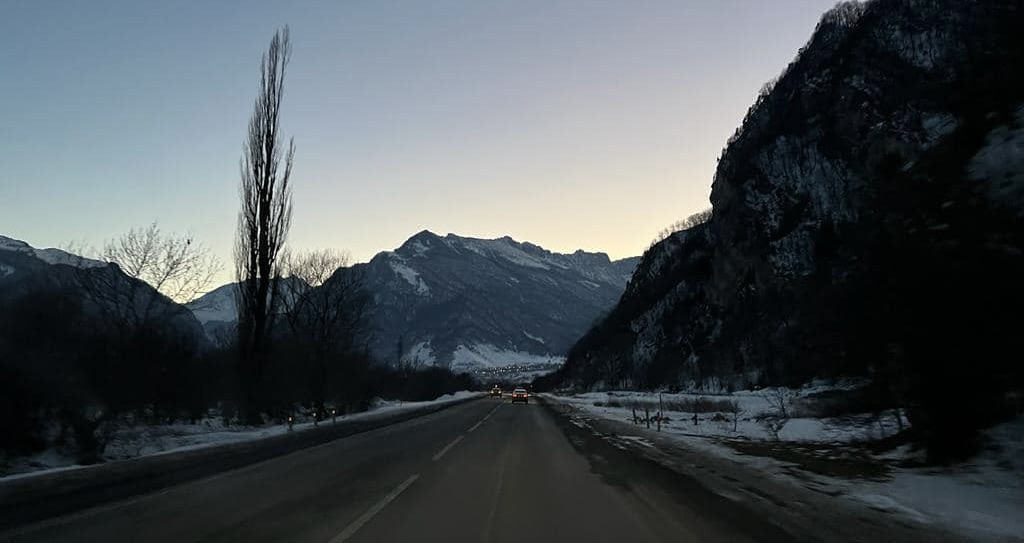
The approach to Verkhnii Lars
What he said was quite true. I had left Russian territory less than 24 hours previously and then almost immediately entered again using the same single entry visa. In fact, the screen on his desk showed that I had previously entered via Sochi airport at 1 o’clock in the morning on the 19th January, 2022, just 3 days previously. Crossing the border 4 times in 3 days was more than enough to attract the attention of the Bureau of Internal Affairs. The fact that Russia was, at that very moment, amassing troops at the Ukrainian border ahead of a ground invasion, undoubtedly added to the tension within the border forces.
His records also listed my first entry into Russia, in August 2019 at this very border and travelling in the same vehicle but with two young children. We were two thirds of the way through an incredible summer road trip which had set off from France in early July, passing quickly through Italy, by ferry to Greece and then overland to Istanbul. We then spent 4 weeks trying everything Turkey has to offer from the turquoise coast to the Iranian border. Exploring Roman ruins in Pamukkale, swimming in the crystal waters of the Mediterranean at Fetihye, wading up narrow gorges in Saklikent, climbing through caves in Ihlara, kayaking around the sunken ruins of Simena and wild camping amongst bears inside Nemrut Dagi volcano crater. After another week in Georgia, enjoying the beach resort of Batumi and off-roading into the mountains around Svaneti, we crossed over into Russia, with a stamp that showed our vehicle had been temporarily imported for a period of 1 year.
Within 5 minutes of entering Russia we were pulled over by the police and extorted. I had inadvertently driven past a police officer who was flagging us down. The signal for this is a quick wave of a short white stick at waist height. Not recognising this nonchalant gesture, I had driven straight past the standing police officer who immediately radioed his colleague in a car further down the road to pull us over and pay for our faux-pas. Not speaking any Russian, the communication between us was strained but I got his point. Pay 200 and avoid a court summons.
Having only just entered Russia I didn’t have any local currency and hadn’t even checked the exchange rate. I went into a nearby petrol station and withdrew 200 roubles. By the time I got back to the police car he had already pulled over another dangerous criminal. I passed him the 200 roubles to a look of incredulity. For starters I was clearly not using the correct etiquette. With a third party now present the bribe should have been subtly palmed to him, not flaunted in full view. It also became immediately clear that he had meant 200 euros not roubles. Luckily, at this stage he was busy dealing with his next victim so he waved me off in disgust.
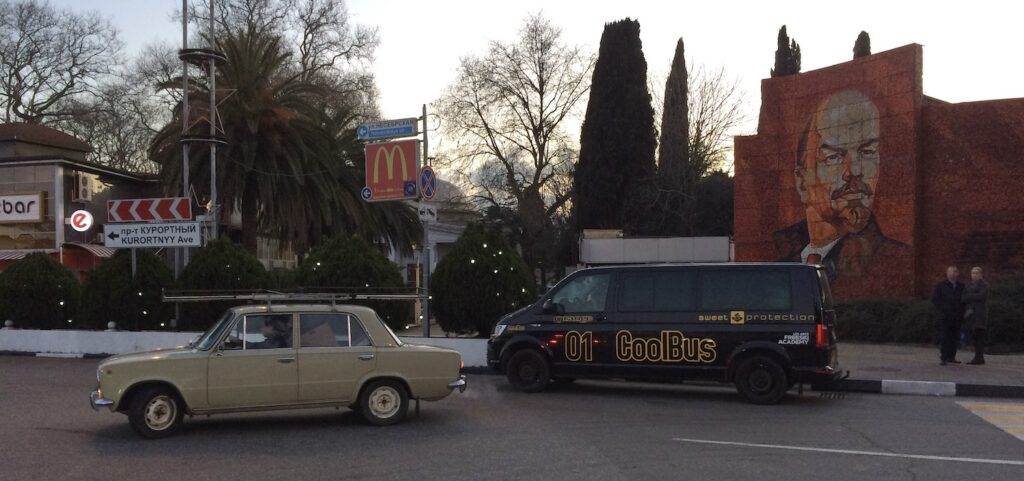
01 in Sochi
Twenty minutes further down the road I finally found some data signal on my phone and checked the exchange rate. 200 roubles was about 7 euros. No wonder he was miffed.
From here we drove west and then back into the Caucasus to visit Mount Elbrus, the highest mountain in Europe. This part of Russia, known as Northern Ossetia, is a little unstable as was demonstrated by the frequent military road blocks with heavily armed soldiers and tanks. The British government were advising against all but essential travel to the area, something I was not aware of until after we left. Elbrus was spectacular but certainly not very tourist friendly. We stayed on the only campsite in town, where it was more pleasant to wander off into the woods with a shovel to do your business than to use the single wooden shack where everyone else’s business was piled up to within a few cm’s of the seat.
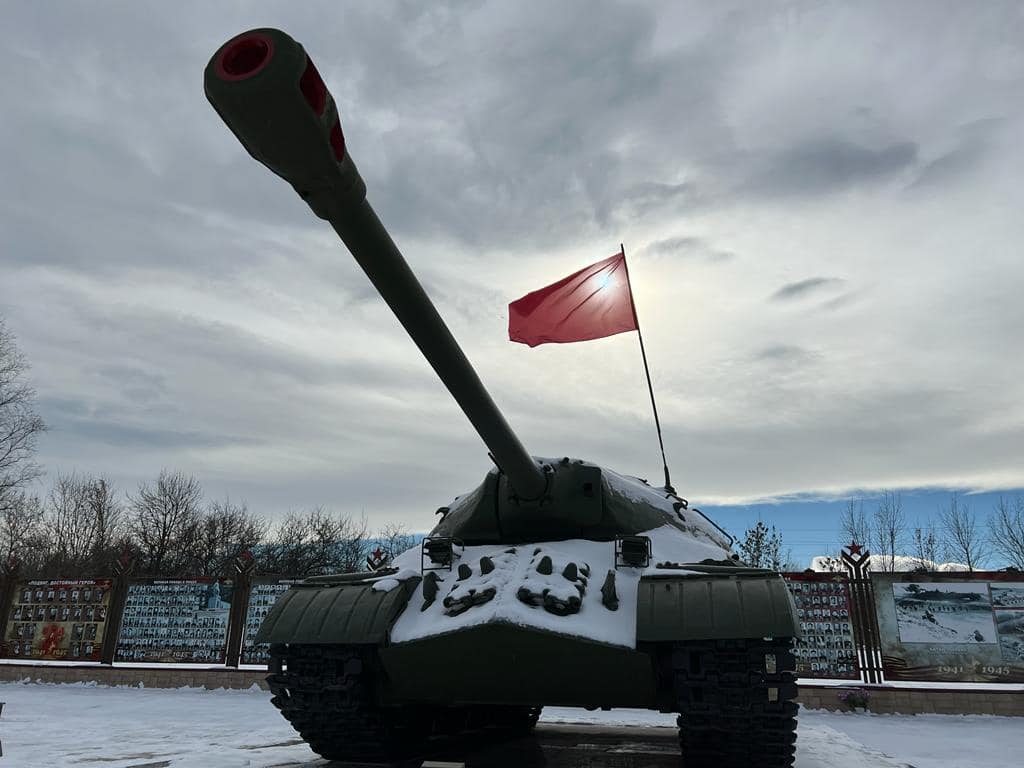
Tanks, a lot
We then drove further west to the Black Sea coast. Sochi is a large seaside resort and comes with all the usual tourist trappings. We really enjoyed the place and also visiting the mountain resorts of Krasnaya Polyana. Here we met up with a friend of a friend, Alexey, who had agreed to look after our van for a year.
Having driven so far east, it made more sense to leave the van and fly home, returning to collect it the following summer and continue eastwards. A friend at home in Bourg, told me of his visits to Sochi for skiing in the winter and how good it was. He put me in touch with Alexey and the plan was hatched. We dropped the van with him, paying in advance for several months worth of parking in the ski resort multi-storey car park, and then jumped on an overnight train to Moscow for a few days of sightseeing before flying back to Paris.
Having a van stationed in a Russian ski resort proved temptation enough for me to return the following January, with four friends, for a two week ski holiday. The snow was poor for the first week, and we spent our time getting to know the layout of the four resorts, drinking lots of vodka and generally doing tourism. We received a dump of 45 cms at the start of week two and were primed to take full advantage. It was an amazing experience that became more poignant a month later as overseas travel ground to a halt and the world shut down in response to the pandemic.
And herein lies the problem. As mentioned, on entry into Russia, our vehicle received stamped paperwork permitting it to be temporarily imported for a period of one year. With the advent of COVID, travel to Russia became impossible. For eighteen months they simply did not issue tourist visas. By the time these were available and I had found time to travel to Paris to get one, more than two full years had past. Initially I did toy with the idea of just flying out, picking up the van and heading to the border with crossed fingers but then I remembered all of the military checkpoints we had passed. The idea of negotiating these in an illegal vehicle filled me with dread. At the very least, I’d be exposing myself to the possibility of having to pay multiple substantial bribes.
Looking online, I found reports from other people in similar situations. The Russian authorities had extended the validity of temporary import papers but even this had since expired. I saw talk of having to pay the cost of full importation of the vehicle into Russia before being able to export it again, with costs ranging from 500 to 2000 euros. Abandoning the vehicle was definitely not an option as I was the registered owner and there would be consequences, and besides, it had a value of at least 15,000 euros so it was worth taking a hit on the fines.
In the intervening years, our friend Alexey had moved to Moscow, handing the van over to his friend Sergey, who had it parked up in the yard behind his house. I had been chatting with him regularly and he found us a lawyer based in Vladikavkaz. This was the nearest town to the border crossing back into Georgia and had a tax office where we could manage payment of the necessary fines. I corresponded with the lawyer who arranged an appointment with the tax officials. With this in writing I finally had everything in place for a rescue mission.
A good friend of mine, Matthew ‘Wallace’ Walker was at a loose end as he was still recovering from an accident that saw him falling 8 metres from the boom of the largest sailing yacht in the world (another story). He had been mithering me for many months about staging a rescue and was very keen to be involved. I first met Wallace when we were both residents at a seasonnaires hostel in Les Arcs more than 20 years ago. We have been good friends ever since and he worked many seasons as a Cool Bus driver. We had also been on our own road trip from Bourg to Istanbul a few years previously, so we had some joint experience along the route we would need to take.
We both secured Russian visas during late autumn 2021. My busiest period at work is the run up to the winter. During October, November and December I am generally working 7 days a week on preparations. As such, a trip to Russia was out of the question until the new year. Whilst ‘Peak COVID’ had long since past, there were still many restrictions in place and it was necessary to procure a negative PCR test before entry into Russia.
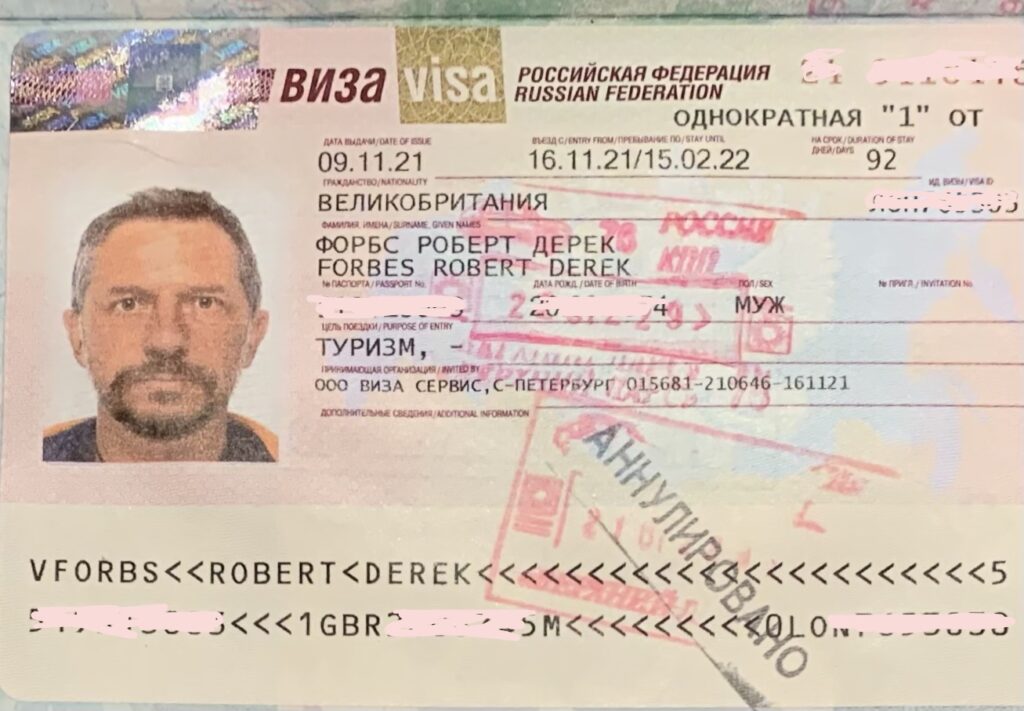
Wallace was based in the UK so our plan would be to fly into Sochi separately. We initially penciled in a travel date of 11th January but then I picked up a dose of COVID a few days prior. I’d spent most of that weekend DJing at the Launchpad Big Air contest in Les Arcs which was good fun but did involve standing around in the cold on the side of a mountain for 8 hours a day. As such, it hit me hard and I was completely wiped out for several days. I arranged another PCR test for the 17th and when the results came in negative on the morning of the 18th, I immediately booked myself on a flight to Sochi that afternoon.
I arrived in the early hours of the 19th and headed straight to the nearest cheap hotel to bed down for what was left of the night. Wallace’s flight options were not as straight forward and the best he could manage was to arrive in Sochi on the morning of the 20th. That gave me a full day to get everything ready for the big road trip back to France.
First job of the day was to find the van! Our friend Sergey had already been incredibly helpful, but he was away in Moscow. Via WhatsApp, he explained where the van was parked, which was actually a half an hour further up the coast, and detailed how to get there by train, which ticket to buy, what platform to use and where to get off.
It’s worth pointing out that literally no one here speaks English, and why would they? It’s a very popular destination for Russians but not so much with tourists from the west. As such, communication for me relied heavily on google translate. Any pointers Sergey provided helped immensely.
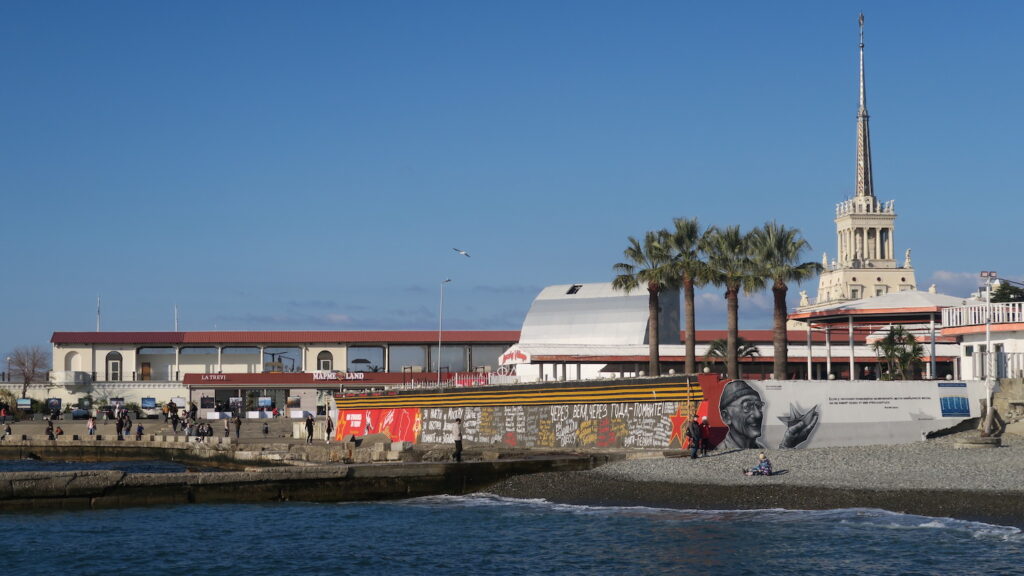
Sochi
Having negotiated the train ride, I followed google maps to the pin drop and there she was. Two years had passed since I’d last laid eyes on van 01, it was an emotional moment for both of us!
Sergey had left the van key with a neighbour but I’d also brought the spare along so I immediately set about getting her fired up. Needless to say the battery was flat. I have no idea how long it had been sat dormant but I had jump leads in the van and it was fitted with an auxiliary battery. I’d never tried a jump start like this before but was relieved to find it provided just enough juice for the motor to splutter back to life! With the engine running I realised that this was something I had been worried about, but trying to ignore.
I’d flown across 3 timezones into Russia and then taken a train to a nondescript Black Sea coastal town. The weather was pretty terrible with huge waves lashing the coast and snow falling from the sky. I was alone in a small, empty dirt car park. I was here to collect a van that I hadn’t seen for two years, I had no idea what it had been up to in the intervening time and what state I would find it in. If the van hadn’t started I had no back up plan whatsoever. Obviously my French roadside assistance wasn’t going to be much use and the only local person I knew was now 1600 km away in Moscow. It had been something of a gamble but, so far, it appeared to have paid off!
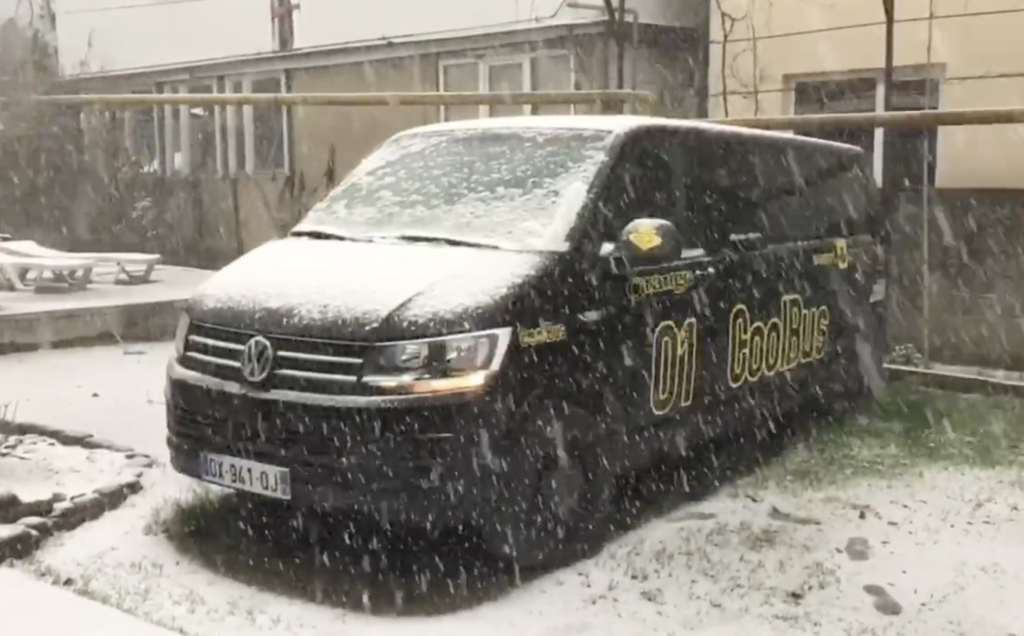
First time seeing 01 in two years
It was sounding pretty rough so I let it idle for half an hour until it improved to the extent that I was happy to drive the 40 km back to the airport ready to collect Wallace the next morning. On the way I picked up a few supplies including 10 litres of coolant (Sergey had told me it was losing this steadily) and an air compressor for the tyres. Another thing I worried about was getting a flat. I knew the spare was knackered after we suffered a double puncture two hours deep into an off-road adventure in the Georgian Caucasus in 2019 (another story).
Following another evening at the cheap airport hotel watching films in Russian, I was there to meet Wallace as he walked out of Sochi airport at 11am on the 20th January. Thanks to the previous days efforts we were able to immediately hit the road and start the long journey back to central Europe, but progress on that first day was a little painful.
Take a look at Sochi on the map. It sits there on the Black Sea, just north of the Caucasus. The most direct route back to France would be north west along the coast and then through Crimea and Ukraine. Even before war broke out in Ukraine this was not an option. To set off in this direction it would have been necessary to go right up to the extreme north or even into Belarus. This quickly stopped looking attractive both in terms of distance and risk.
South then? Well no, because to go south you need to pass through Abkhazia, a break away region of Georgia that allies itself with Russia. You can enter from the north but you won’t get out the other side into Georgia. West of Sochi is the Black Sea. Driving east takes you up a dead end valley in the mountains. The only option is to drive north west along the coast for nearly 4 hours until you are beyond the foothills of the Caucasus and then head east. In this way we spent the first day driving for 10 hours only to end up 300km further away from France than when we started.
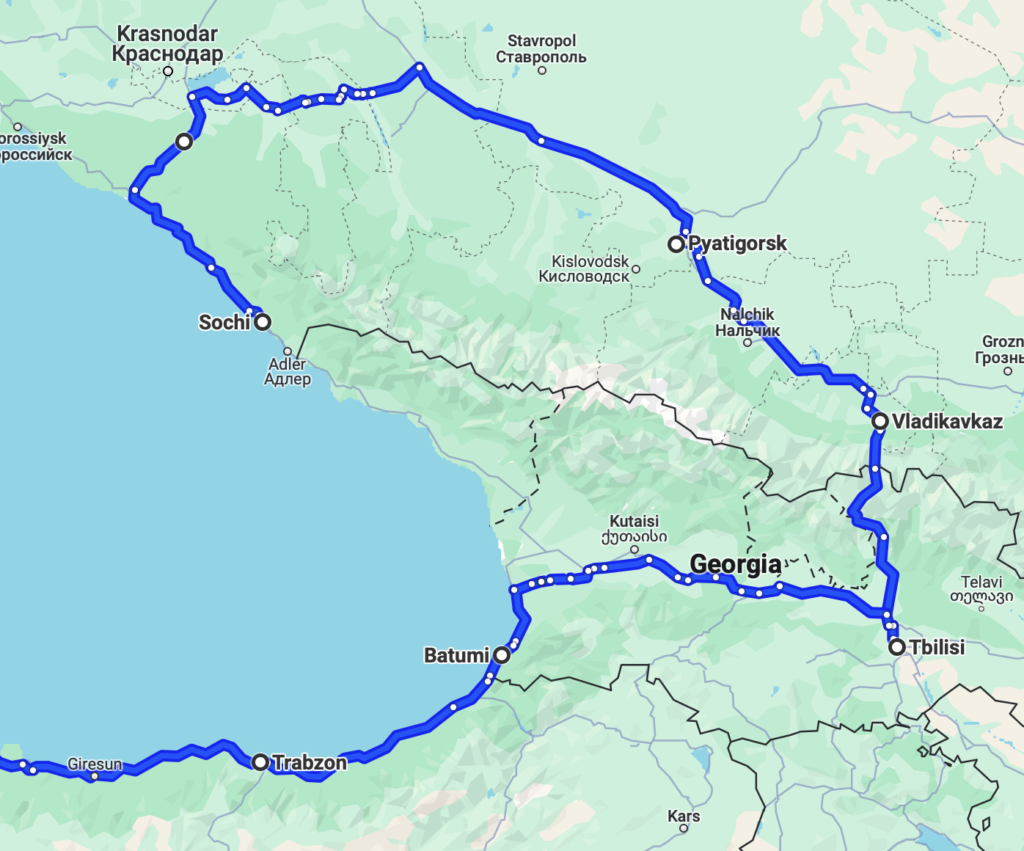
Not the most direct route
Fortunately the drive was spectacular. Firstly along the convoluted Black Sea coastal road and then inland across the snowy expanse with the mountains ever present in the distance to our right. We rolled into the town of Pyatigorsk at 10pm, reasonably satisfied with our first days progress and checked into the Golden Hotel. If you ever find yourself in this neck of the woods I can highly recommend it. We headed straight up to the roof top restaurant for few well earned beers.
Breakfast the next day was in the windowless basement restaurant, which would be fine, had there not been a power cut. A candlelit breakfast is not something I have experienced before but it certainly added to the ambience as the two of us sat in what can only be described as ornate thrones while we stuffed ourselves with sausage, eggs and toast.
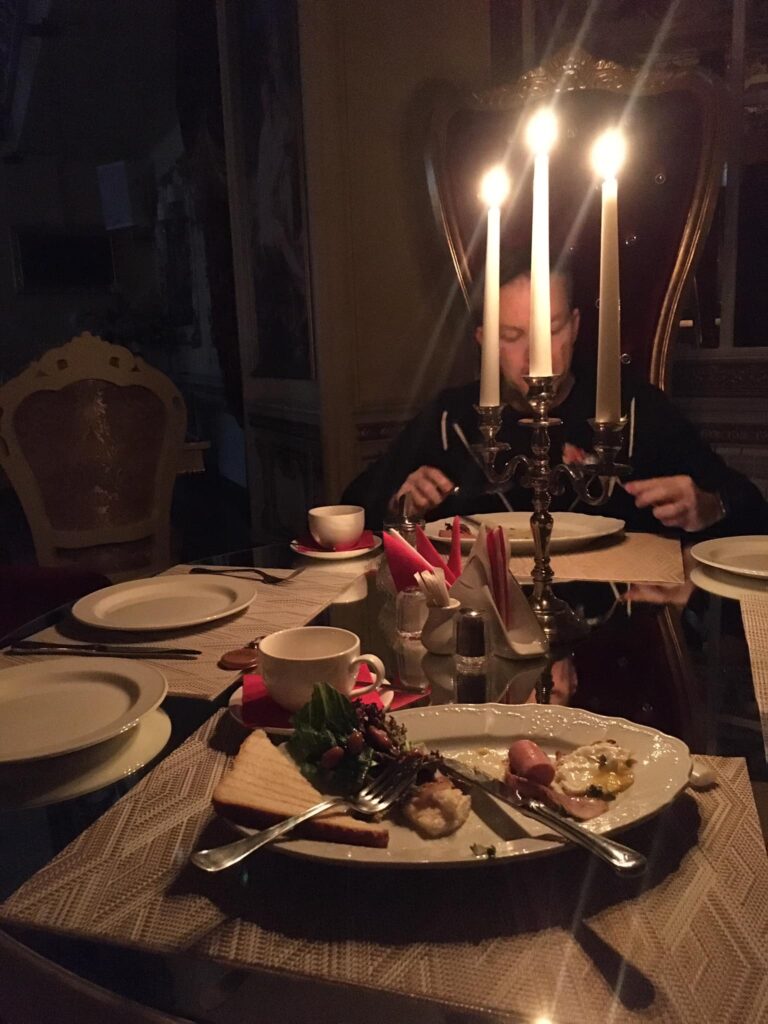
Candelit breakfast
Day two on the road brought the real crux of the trip. A short three hour drive followed by a meeting with the lawyer to make good our paperwork. She came to meet us at the Vladikavkaz Hotel, which is the fanciest establishment in town. We arrived early and were already two coffees deep by the time she walked through the door. We had dealt with most of the details previously by email so I’m not sure why we needed to meet up a full 90 minutes prior to our appointment at the tax office. All that was left for us to make idle chit chat while we nailed another two coffees each. I’m sure it would have felt awkward anyway, but add in the caffeine overdose and the fact every exchange involved us typing sentences into google translate and it started to feel like an out-of-body experience.
From there we headed to the tax office. Wallace waited in the van while I accompanied the lawyer to deal with paper shuffling and signing various forms, the contents of which were a total mystery. Finally I was presented with the fine to be paid. This came to 1500 roubles, a whopping 17 euros. It hardly seemed worth the time of the two officials that dealt with us but having expected to pay at least 500 euros I was over the moon! A quick visit to the bank to pay this and the lawyers fees of around 300 euros and we were rolling out of town towards the border, happy that this big hurdle was now behind us.
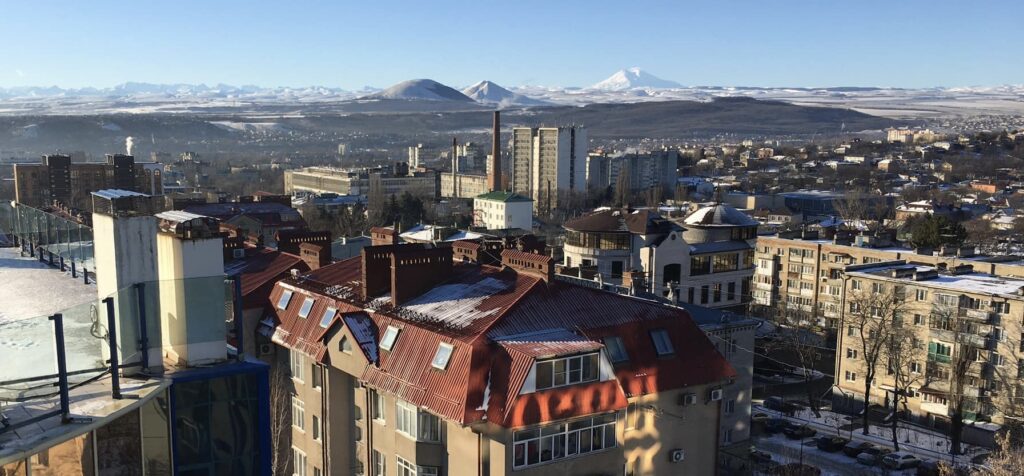
Looking towards the Caucasus from the hotel roof
There was a small amount of explaining necessary at the Russian border but they were satisfied with our stamped fine receipt and we were through within 90 minutes, it almost seemed too easy! Our feelings of elation soon came crashing down at the Georgian border. Naturally I had checked the COVID restrictions for entry into Georgia which showed this was possible with evidence of full vaccination. Since we both had this I thought no more of it. Turned out this only applied to entry by air. To enter Georgia by land a PCR test was necessary. Who knows why they saw fit to make this distinction but no amount of pleading was going to work on the border guards. “Back to Russia!”
And so we found ourselves back at the same border crossing, attempting to cross back with a single entry visa that had already expired. Some time consuming exchanges via google translate ensued before they sent us off to fill out two forms. I filled out one with my details and Wallace did the other. This took some time as it was now very dark which hinders the performance of the google translate camera. We had to do it one sentence at a time but eventually all boxes had been filled. I then went off to queue up in the freezing cold for 45 minutes in order to hand the forms in through a small window. Some time later it became clear I was supposed to complete both forms in duplicate, so I went off to start again.
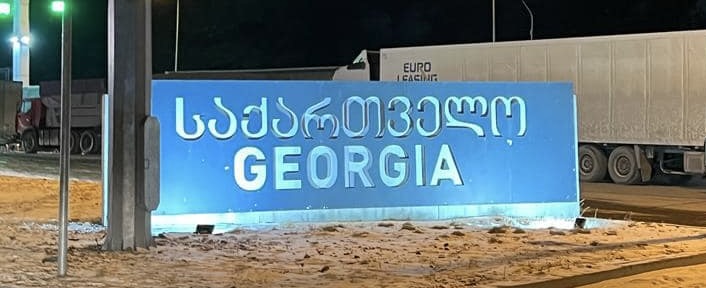
So near, yet so far
To be fair, the border guards were very helpful and did their best to assist us. By the time we had all the formalities completed 4 hours had past and we had become quite friendly. After a few exchanged hand shakes and backslaps we were on the road and heading back to the Vladkavkaz hotel for the night.
The next morning I was out before breakfast looking for a COVID test centre. There was one just a few doors down so we were able to get this done early, with results due at 3pm. That left us with five hours to kill.
During World War II, Hitler was keen to capture the oil fields in the Baku area of Azerbaijan to help fuel his war efforts. To this end he sent his army from the north, to cross the Caucasus mountains. They only got as far as Vladikavkaz where the Soviet army forced them back. The Russians, are quite rightly, very proud of their defeat of the Germans here which came shortly before the battle of Stalingrad, a major turning point that was the beginning of the end for Adolf.
As such, there is a lot of World War II history in Vladikavkaz and, being geeks, we spent most of our free time soaking some of this up. They certainly know how to make a decent war memorial. And the Vladikavkaz hotel knows how to dish up a delicious spicy tomato soup in a bread bowl.
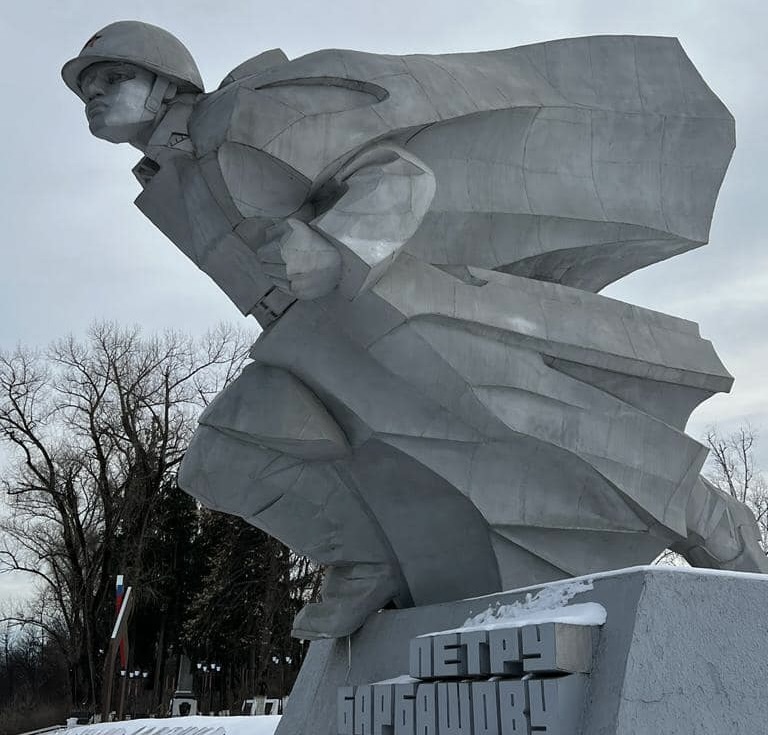
By mid-afternoon we were on our way back to the border crossing with negative PCR tests in hand and this is where we found ourselves attracting the unwanted attentions of the Bureau of Internal affairs. Wallace was the first to go in for interrogation. They tried to break him for an hour but gave up and he was escorted out in silence, presumably so we couldn’t corroborate our stories. They threw the same at me but with similar results, so as dusk set in we found ourselves back at the van with the green light to proceed once again towards Georgia.
We proudly showed our PCR tests to the gruff guards at the Georgian border who barked at Wallace to get out of the van and go inside to have his documents checked. I was through fairly quickly in the van and then had a worrying wait of 30 minutes before Wallace was given the all clear and finally we were in Georgia with van 01 successfully exported!
By this point it was about 8pm and fully dark. We still had around 160km to drive along the military highway to Tbilisi. This is a major trucking route which is very busy during the winter months. Also known as the Caucasus bottleneck, it’s not unusual for it to shut for 5 days at a time with snow. It was open this evening but there was a backlog of trucks making the crossing. This is the only way to get by road from Russia through to Georgia, Armenia, Azerbaijan and Turkey. Some of the vehicles were ancient and seriously struggling up the steep inclines.
It was looking like a potentially painful journey until a Georgian police officer swung by and advised us to pull out into the lane of oncoming traffic and squeeze our way through. It would have been amazing to cross the mountains in daylight and see our surroundings but the excitement of passing trucks around blind bends in full darkness partially made up for it. I would say we passed 150 of them before we reached the southern side of the col. After a few navigational errors, we rolled into Tbilisi at 22:45, quickly checked in and then headed to a bar to celebrate with a few beers and vodka shots to the soundtrack of a live Georgian heavy metal band.
Day four on the road brought a watershed. Finally we had the opportunity to turn west and start reducing the distance between us and home. From Tbilisi we drove four hours back to the Black Sea. It was a little soul destroying to realise that we were now just 300 km south of where we had first set off from, only separated from Sochi by the small but inaccessible region of Abkhazia. Also, that we were now in the wrong continent. The Caucasus mountains separate Europe from Asia. We would not get back into Europe again until Istanbul.
We headed south along the coastline, through Batumi and into Turkey. What a contrast this border crossing was compared to the previous one. Happy smiling faces wishing us welcome and the whole process took no more than thirty minutes. Another three hours of driving along the vastly superior coastal roads of Turkey brought us to the city of Trabzon at the much more civilised hour of 6pm. Naturally the first thing we did after checking in was to find ourselves some kebabs. With this ticked off we looked for a bar and soon found ourselves in the very welcoming surroundings of the ‘Green Pub’. Local football club Trabzonspor were playing Galatasaray in Istanbul that evening and virtually every bar in town was showing the match. The place was packed but the staff managed to find us a spot at the bar to sit and watch.
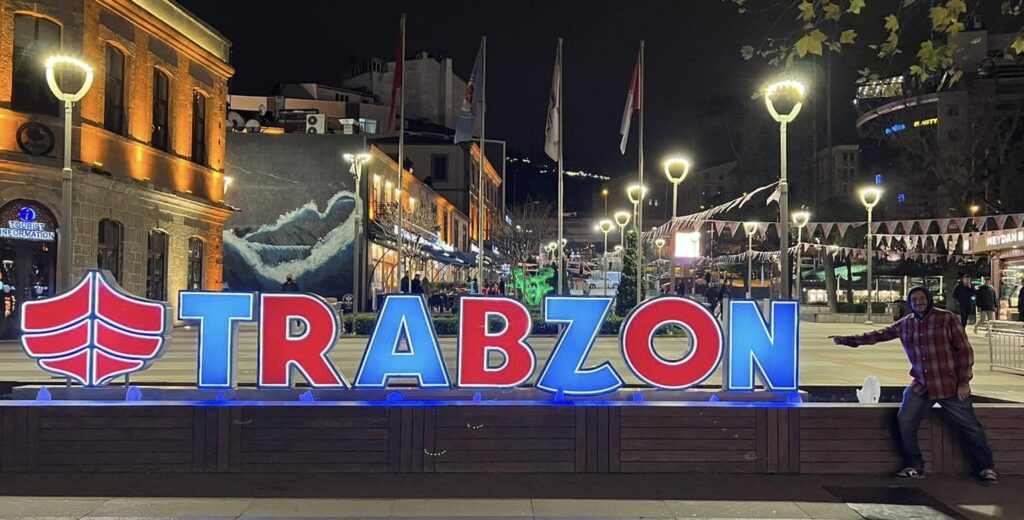
The local side were down 1-0 when we arrived but two goals late in the second half saw them take victory and the place erupted! There was much singing and dancing, hugs and rejoicing. After soaking up the atmosphere for half an hour we set off back to the hotel only to discover the city centre was awash with revellers. Four or five vans had pulled up in the square with huge sound systems in and were blaring out Turkish dance music at full volume. The place was full of people dancing, letting off flares and fireworks, and doing burnouts – unbelievable scenes!
The next day we rolled out of Trabzon to rather dismal weather. It was cold and raining and the temperature continued to drop as we made our way along the coast. Pretty soon it was snowing and, when the main road veered inland and started to climb, it started to settle. The traffic got slower and slower until it ground to a complete halt. We sat in the same spot for an hour, watching the expected delay slowly increase on google maps. It was pretty obvious this wasn’t going to clear for some time so we swung over onto the opposite carriageway to back track to the previous exit and then set off into the snowy Turkish hills.
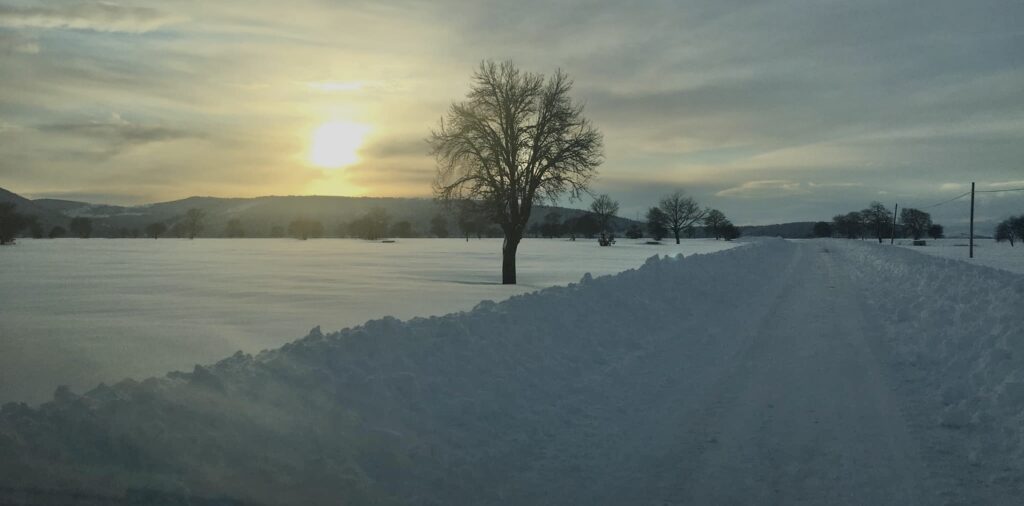
Frozen Turkey
Our good friend Sergey had fitted new snow tyres to the van and between us we had 30 seasons of Cool Bus driving, so a little bit of snow on the road was not going to stop us. This was easily the most spectacular driving of the trip. Rolling hills, snow covered mosques, roads completely blanketed in white, it was slow going but only because of the conditions. Hardly any other cars were out braving the elements on these smaller roads. We had hoped it might be possible to make it all the way to Istanbul but in the end were very satisfied with Duzce, some 850 km in just over 12 hours. It was a very long day that required full concentration and we flopped down on our hotel beds at 11pm without even bothering to find any dinner.
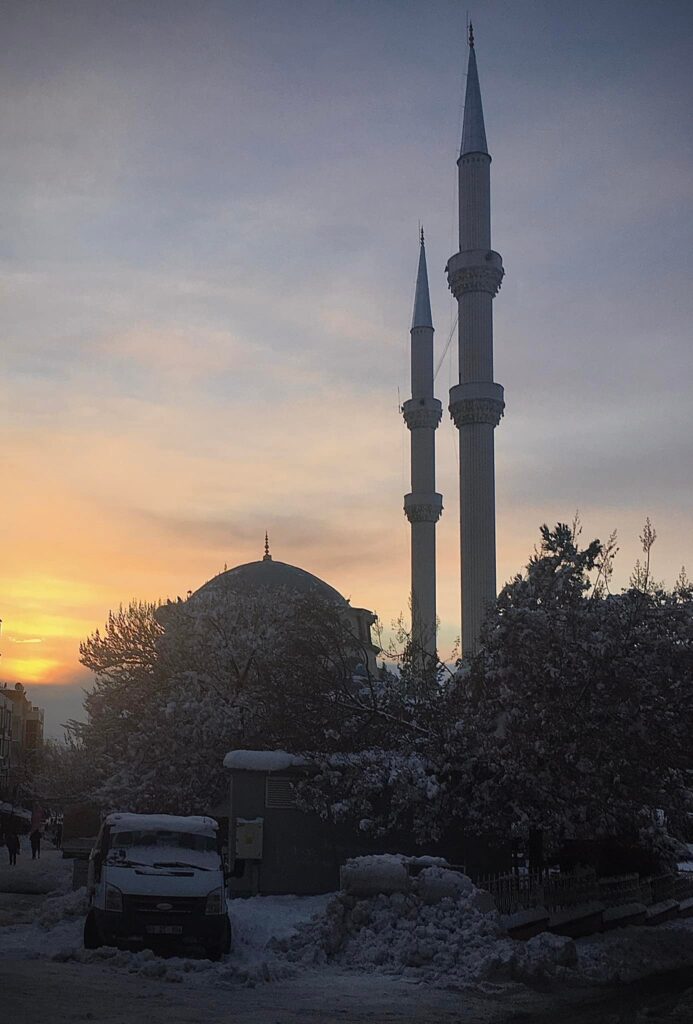
At breakfast the next morning we sat watching the news on Turkish TV. It seemed the snow had caused more havoc closer to Istanbul. This was confirmed when we received a message from a friend of ours.
Wallace and I met Pierre during our first winter in Les Arcs, 20 years ago. He was involved in running Bar Mont Blanc which was a very popular local hangout. He was currently on his way back to the French Alps from Iraq. Yes Iraq! This is the sort of thing Pierre likes to do for his holidays, visiting places most people wouldn’t consider. He is also pretty handy with a camera and has had photos from North Korea published by the BBC. I would highly recommend taking a look at his Instagram which is brimming with incredible shots from unusual destinations. https://www.instagram.com/pierredepont
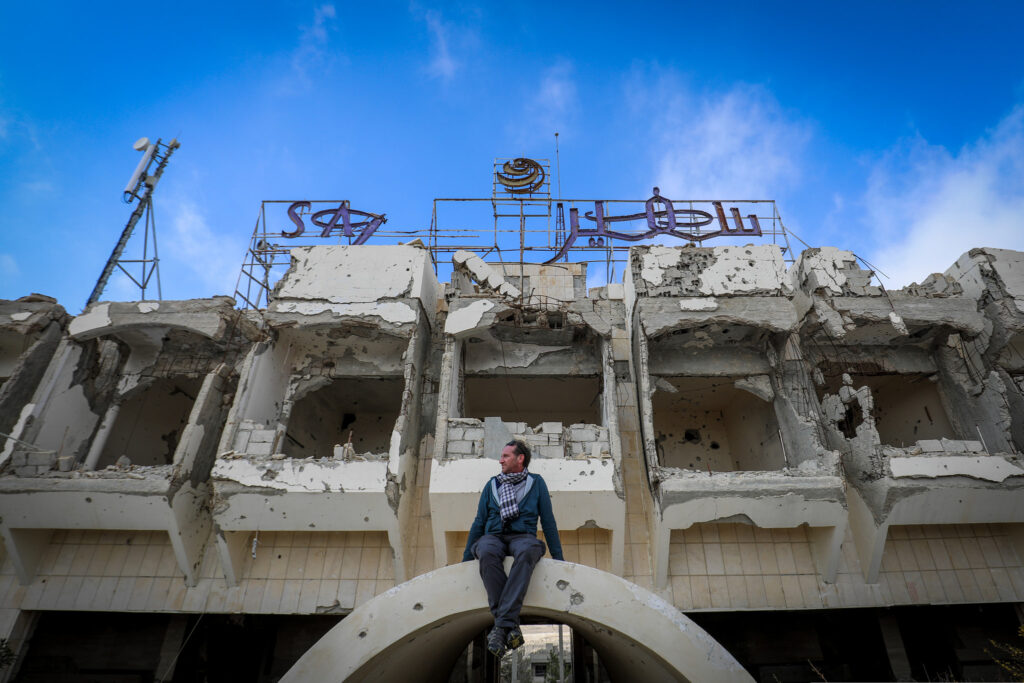
Pierre in Iraq shortly before we met up in Istanbul
His journey back from Iraq involved taking a bus to Istanbul. Originally scheduled to take 24 hours, with the snowstorms it ended up being 42 and he had rolled into the city that very morning. Given we were just a 3 hour drive away from him and headed to the same valley in the French alps it made sense for us to pick up a passenger for what turned out to be the longest Cool Bus transfer in history – 2458 km from Istanbul to Landry!
Pierre had already checked into a hotel and set about reserving a room for us as well. We were there by lunchtime but Pierre was still very tired from his 42 hour ordeal so he caught up on some sleep while we went off to explore a snowy Istanbul. Both Wallace and I have been here a few times before but it never disappoints and seeing the familiar landmarks covered in a blanket of snow added a new dimension.
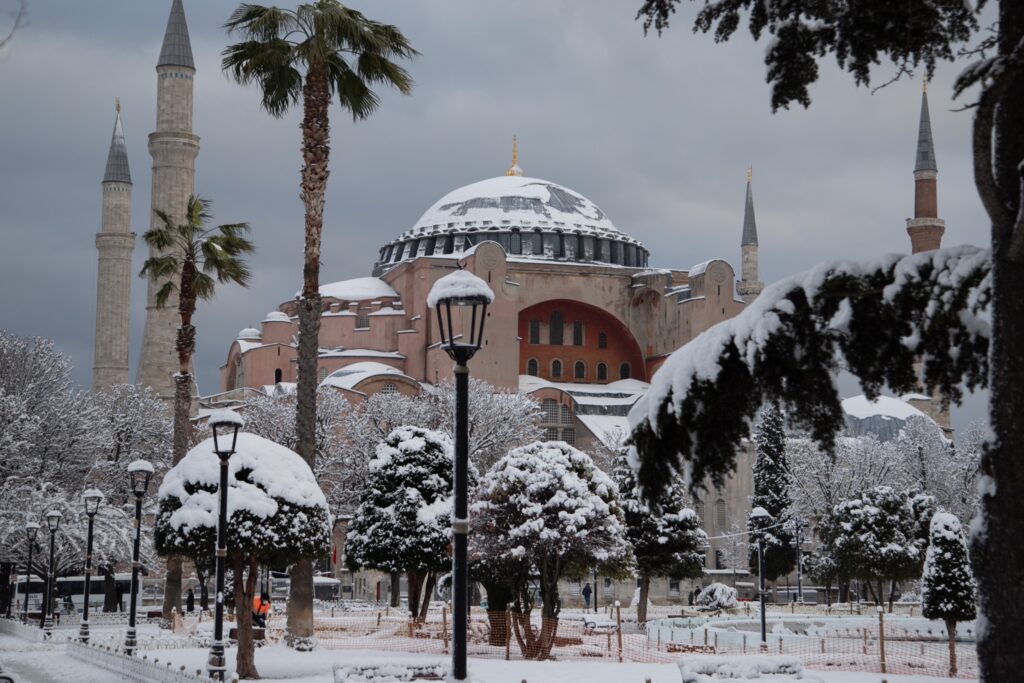
Hagia Sophia (Pierre Depont)
We took a turn around the Blue Mosque, Hagia Sofia and the Grand Bazaar before retreating to a friendly bar run by two brothers, to warm up. A few pints in, Pierre turned up and we decided to celebrate the occasion. More beers, kebabs and possibly the odd shot or three followed. My memories of the latter part of the evening are very hazy and that wasn’t just due to the shisha smoke!
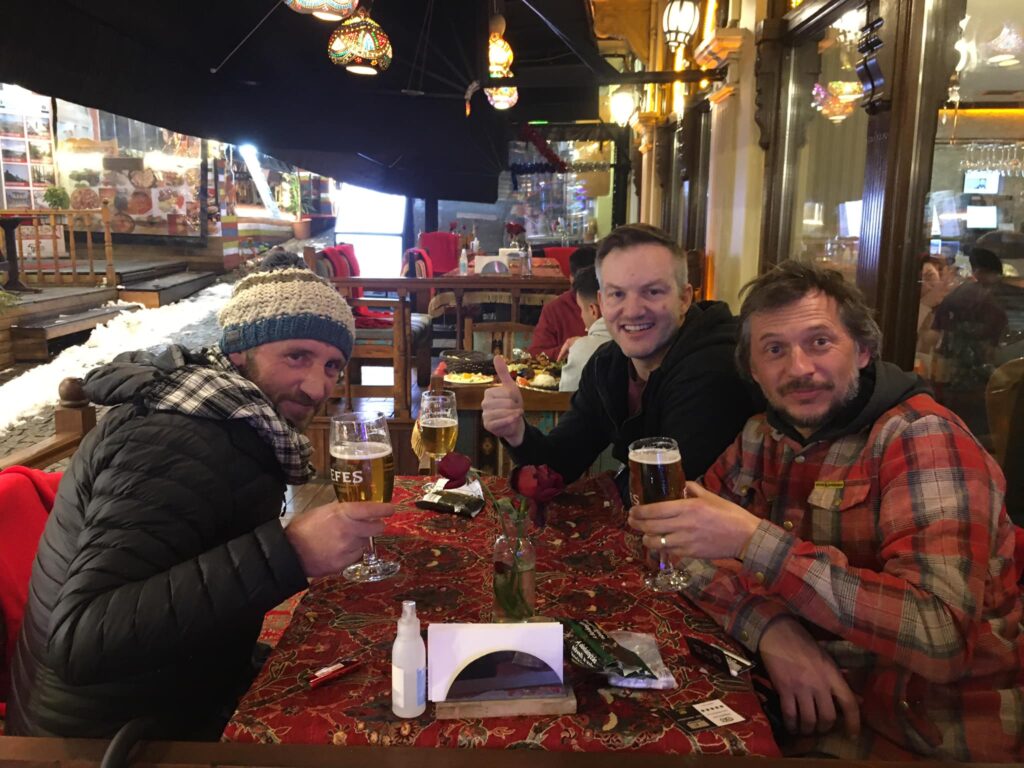
The next morning we set our targets for Meteora. We were ultimately heading for Igoumenitsa where we could catch a ferry to Italy but that was at least ten hours away and the boat set off at 8pm. With snow still lying on the road and another border to cross it seemed unfeasible to achieve this in one day. I had visited Meteora twice in the past and was keen to show the place to Pierre and Wallace and it would leave us with just a few hours to drive to the ferry port the next day.
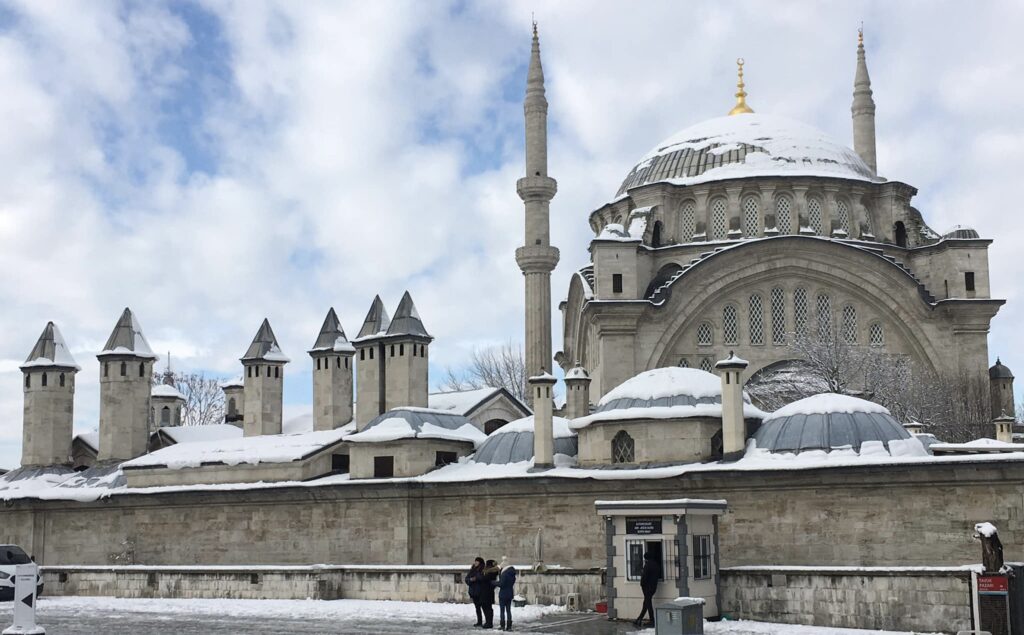
For the first time we found ourselves on proper motorways and were able to cover the kilometres quickly. We hit the Greek border not long after lunchtime. Obviously we had checked the COVID entry requirements and were reassured by the sign as we approached the Greek side of the crossing which stated entry was permitted with a vaccination certificate. Imagine our surprise then, when the guard requested our PCR tests! I asked if we could do some here at the border, “No sorry, back to Turkey!”
We queued up to re-enter Turkey and get another stamp in our passports, before driving to Ipsala where we found a hospital that could provide a COVID test with a quick turnaround. The whole process cost us 4-5 hours but the real kick in the teeth came after we had shown our results to the very same border guard at the Greek frontier. With a wry smile he waved us through to the next window where they made us take another COVID test! As a result, it was nearly midnight by the time we arrived at our hotel in Kalabaka.
If you have never visited Meteora, I strongly urge you to do so. It is an area with dozens of stone pillars rising up hundreds of metres from the valley floor. These alone are spectacular enough but what really makes the place stand out are the 700 year old monasteries built on top of them. Originally there were twenty four of these, allowing monks to get closer to God and find peace and tranquility to help their prayers and meditation.
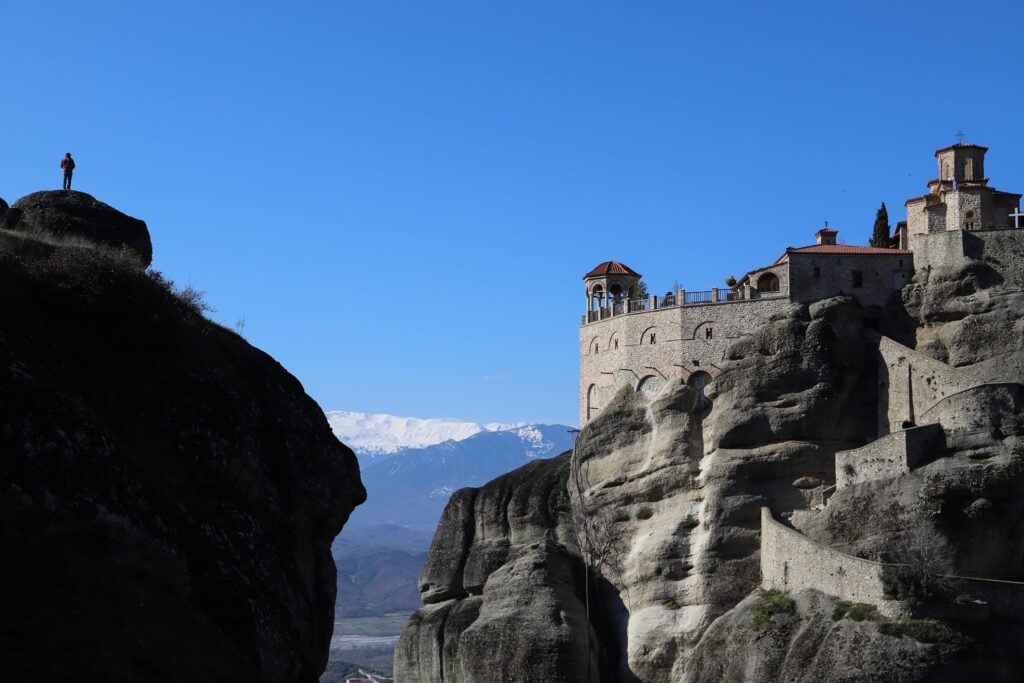
Meteora (Pierre Depont)
Eight monasteries are still intact and can be visited but there are also numerous ruins dotted about the place to discover as well as exploring the rock formations. I’d been there twice before but both times in the summer when the area is full of day trippers. In the middle of winter the place was empty and it was an absolute pleasure to wander around for a few hours.
After lunch we ground out the last few hours to Igoumenitsa and the ferry port. First stop was a doctors surgery to procure more COVID tests for entry into Italy and then a supermarket to pick up some supplies. I’d travelled this ferry route many times in the past and enjoyed it. The journey takes 16 hours but with a cabin to bed down for the night plus loads of onboard amenities – restaurants, bars, a nightclub, sundeck, swimming pool – the time passes quickly.
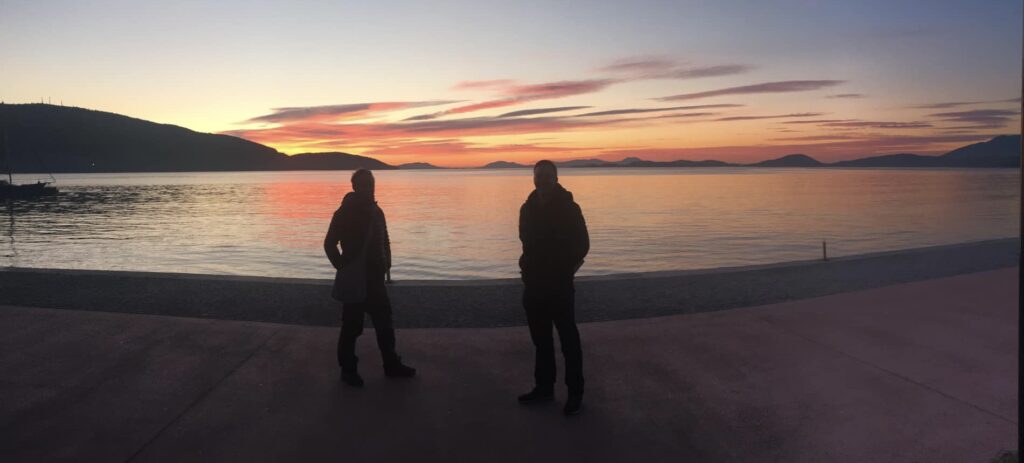
Waiting for the ferry in Igoumenitsa
Now I probably could have figured this out myself but the clientele in January is somewhat different to that of July, essentially just truckers. As such, none of these facilities were present onboard. We did see a sign for a casino but that turned out to be a room with four slot machines in. It was fortunate that we had purchased several beers in advance. After eating some mediocre food in the restaurant we whiled away the rest of the evening playing poker for coppers. The staff didn’t seem to care that we were drinking our shop bought beers in the restaurant. They also ignored the rules that said everyone should wear a mask and a lot of the truckers were even smoking. It was a world away from our summer crossings where the boat felt more like a cruise ship.
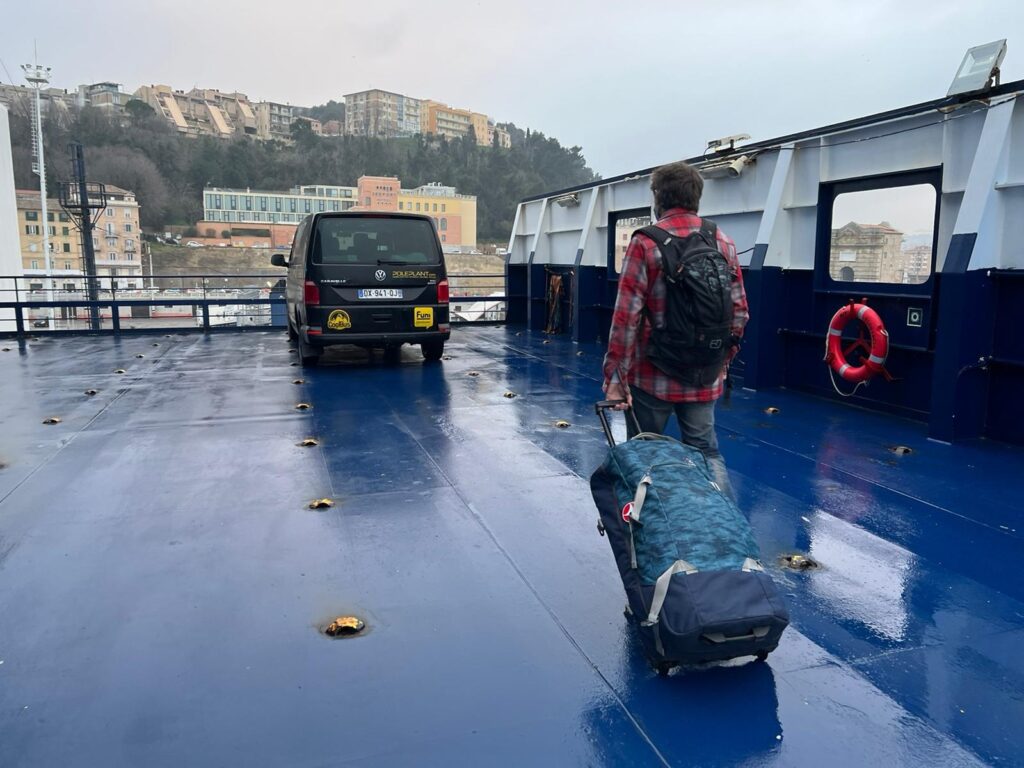
Sailing into Italy
We sailed into Ancona, Italy shortly after lunch on the 28th January. At any other time a journey of 800 km across the width of Italy might have seemed like a bit of an undertaking but for us, after 9 full days of travelling it was just the home stretch. We rolled into the Tarentaise valley just after midnight, dropping Pierre off in Landry en-route. No fanfares accompanied our arrival but it’s fair to say we were feeling pretty pleased with ourselves.
Wallace and I have spoken frequently about this trip in the intervening few years. On paper it sounds like an ordeal but the truth is, we both look back on it fondly. It was a real adventure which seemed to bring a different challenge each day and is definitely in the running for ‘best holiday ever’ for the both of us.
Over the course of ten days we’d driven 4750 km with nearly 70 hours behind the wheel. We’d crossed five borders, two of those twice. Taken 15 COVID tests, driven through snowstorms and crossed the Adriatic. Traversed the highest mountain range in Europe into Asia and then across the Bosphorous back into Europe again. Visited the capital of Georgia, the most celebrated mosque in Turkey and Greece’s famous cliff top monasteries.
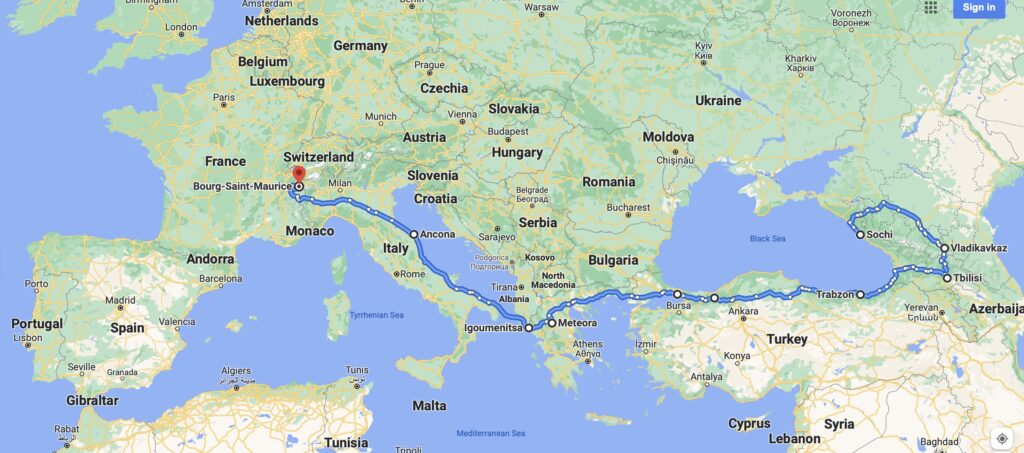
Twenty six days later, Russia invaded Ukraine and travel to this part of the world once again became impossible. I’m not sure what would have happened had we left the van but in the run up to this trip I had received several stern letters from the Russian authorities, insisting the vehicle be repatriated. It definitely had the potential to turn ugly.
Later that year I made another attempt to get further east in a van with my kids. This time we got as far as Armenia before being turned back at the border from Georgia into Azerbaijan. Determined to get further, we took a flight from Tbilisi across the Caspian Sea to Uzbekistan, but that is another story!
Pierre continues to travel to places off the beaten track. He has spent most of the last year in Eastern Ukraine, volunteering to help people evacuate, delivering aid and rebuilding housing and schools. You can help out with this by making a contribution on his Just Giving page here – https://www.justgiving.com/crowdfunding/pierreukraine
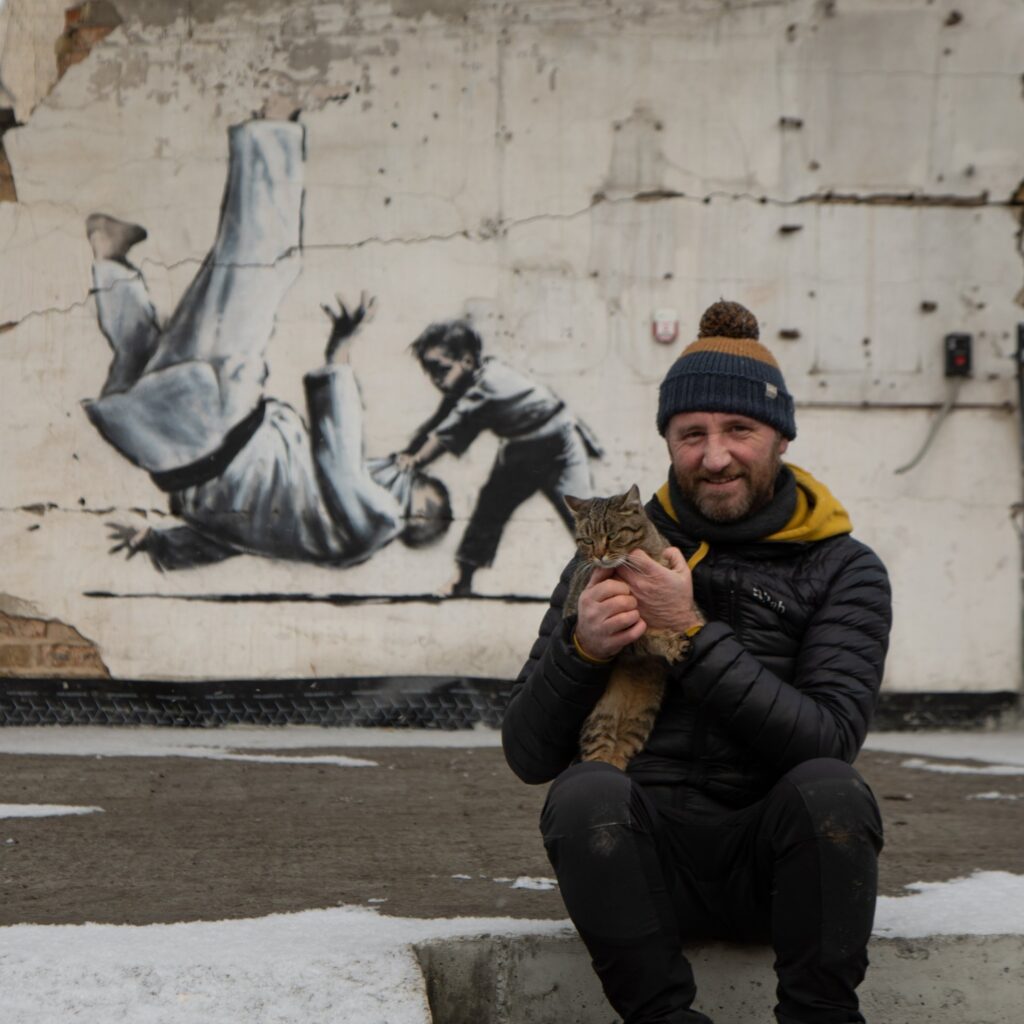
Pierre in Ukraine